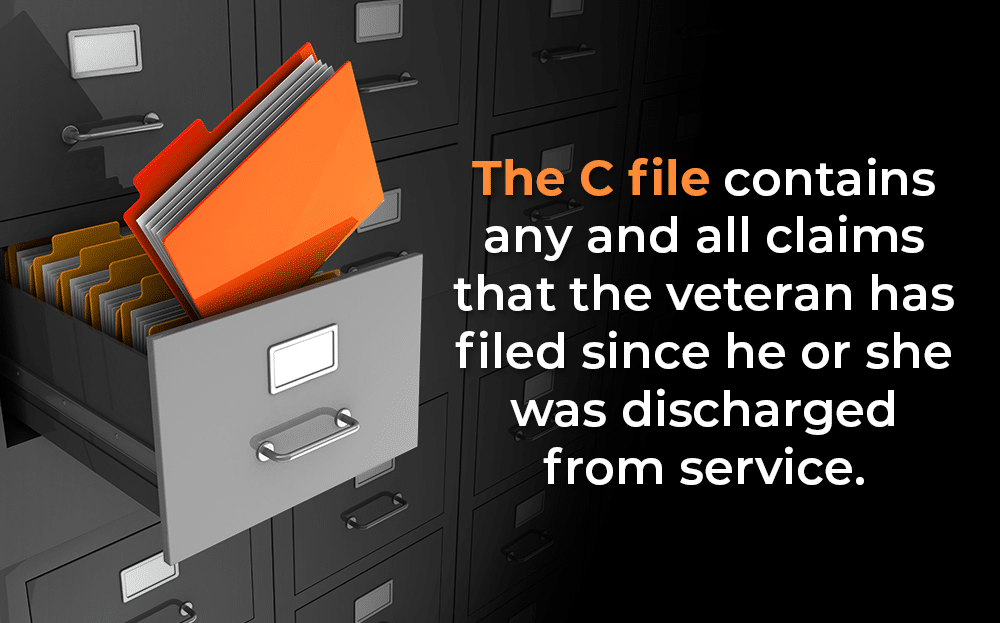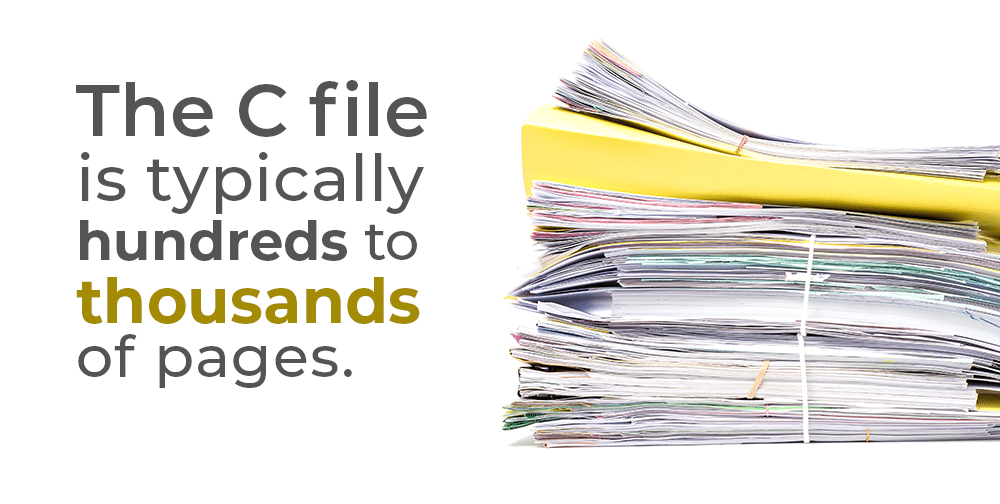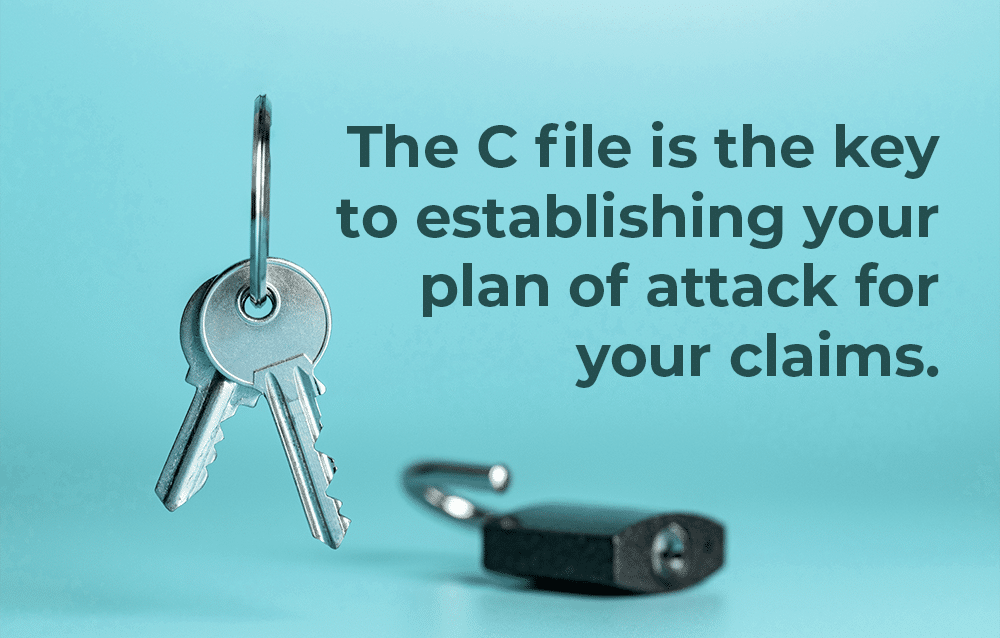Through helping thousands of veterans with their VA benefits, our attorneys have found some common themes in what it takes to win benefits. One of those keys is obtaining and thoroughly reviewing the veteran’s Claims file, aka the C file. This may also be called the VA claims folder.
The United States Department of Veterans Affairs keeps files on all of the veterans making disability claims in their system. This file includes all of the VA forms from your claim, as well as the VA’s decision documents.
VA attorneys Matthew Hill and Carol Ponton explain what the C-File is and why it’s so important:
Have you been struggling to get VA benefits? An experienced attorney can review the decisions in your C-File and choose the best path to overturn a VA denial. Get a free evaluation of your case to see how we can help.
What Is a VA Claims File (C-File)?
The C-file is the folder that the VA benefits section, the Veterans’ Benefits Administration (BVA), keeps on the veteran.
The C file contains any and all claims that the veteran has filed since he or she was discharged from service.
The file also contains any service records or service medical records that the VA has obtained to review the veterans file.
Additionally, the C file will contain all the decisions that have been made in the veteran’s claims and any internal VA memos about the veteran’s case.
These often include the:
- Application for benefits
- DD-214 (Report of Separation From Service)
- Medical records (both service treatment records and VA medical records)
- Ratings decision
- Denial letter
- Appeal documents (such as the Notice of Disagreement)
If a veteran’s C file doesn’t include all of the documentation that they submitted, the VA may not have evaluated enough evidence to award service connection or an adequate disability rating.
This information is also critical in establishing an accurate effective date for disability compensation.
By seeing what the VA is lacking, disabled veterans can better approach an appeal.
By going through the C File, we can detect whether important information is missing and request that the VA gather or provide such information.
For example, many times a veteran’s service records are missing from the C File or the provided records are incomplete.
Without going through the C File, a veteran would not know to request for the VA to obtain the missing service records.
These missing service records could prove “boots on ground” in Vietnam for Agent Orange exposure or provide corroboration for a PTSD stressor.
By having complete service records it may be easier to provide evidence of MOS, performance of duties, and designated unit.
The same goes for service treatment records which can often times show treatment of a condition during service.

It is important to make sure the VA has all of this important information because the VA uses the C File to base its decision on your claim(s).
The evidence the VA uses in deciding your claim is often based on what included in your C-File.
Though the VA has a duty to assist the veteran with obtaining all of the necessary evidence, sometimes all of the evidence is not gathered and by reviewing the C File, an attorney can plan what steps are necessary for handling your claim.
C-File vs. Medical File
A lot of veterans get confused between the C file and the veteran’s VA treating medical file.
To understand the difference one must understand the different sections of the VA.
The veteran’s claim for service connected benefits is handled by the Veterans’ Benefits Administration, which is completely separate from the VA that the veteran comes in contact through medical care. The VA medical care is provided by the Veterans’ Health Administration.
The Veterans’ Health Administration keeps it own file on the veteran of all the medical records the veteran has.
Some of these records will make their way into the Veterans’ Benefits Administration’s C file. But a lot of the medical records will not.
Obtaining a VA C-File for Your VA Disability Claim
As a veterans disability attorney, I often request a veteran’s claims file from the VA. After I review a veteran’s decision and speak with the veteran, I then order the file.
This comes from the appropriate VA regional office. The C file is the key to finding out what the VA has done on behalf of the veteran’s claim and what it has not.
Again, the C file will contain any service records, service medical records, current medical records, C&P exams and other evidence submitted for the veteran’s claim.
Since the C file contains all the information on the claims that the veteran has filed the C file is typically hundreds to thousands of pages.

The 57 different VA Regional Offices take various amounts of time to respond to a request for a C file.
There are a few that take only a month or so.
Other VA Regional Offices can take well over a year to send the file. Most VA Regional Offices take around three to six months.
Once I have the C file I send a copy to the veteran. My veteran is the best historian of his claims.
He will be able to help me know what records he submitted but did not make it in the file and what other records that the VA should have obtained to prove his case.
I review the C file page by page and then meet with the veteran to formulate a plan for each of the claims.
After reviewing the C file, we might discovery that the evidence does not exists to prove a certain claim.
With another claim we might discover that the VA failed to request critical records from the service department. In still another claim, we might determine that we need to obtain further medical evidence to prove the case.
The C file is the key to establishing your plan of attack for your claims.
In theory, you would be able to understand what you are missing from your claim by reviewing your last VA decision.
However, anyone who has read a Rating Decision or a Statement of the Case will know that these documents are not very clear.
When you have a copy of your VA C file, you can look at your claims piece by piece to determine what the VA already has and what the VA still needs to grant you service connected compensation.

Fighting the VA for service connected benefits is a long and hard process. The best way to ensure success is to start by obtaining the C file and finding out what the VA already has, and what the VA does not have, so that you can focus on what is needed to prove your claim.
Get the Assistance You Need
Applying for VA benefits means you need to check that you are eligible, submit supporting documentation, complete an application and file your claim. While this is only four steps, each one can be time-consuming and expectations are difficult to understand at times.
The best thing we can advise is to request a VSO if you feel uncertain. Paying attention to details and providing enough supporting documentation is key to a successful outcome with initial VA disability claims. We also offer a free e-book to guide you through the VA claims process: The Road to VA Compensation Benefits.




